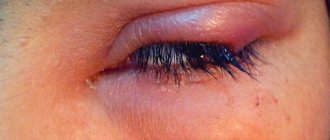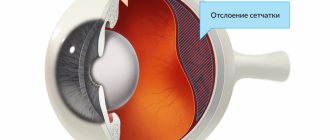Dizziness, its causes and treatment may vary depending on what exactly causes such a symptom.
Dizziness is often accompanied by a lack of coordination, people become unsteady, and in some cases even loss of consciousness is possible.
As a rule, such a symptom does not develop over time and can appear in any person.
However, if you constantly experience dizziness, you should consult a doctor, because these may be signs of illness.
Often, dizziness occurs when quickly changing body position, during a sharp turn of the head.
The sensation also occurs with head injuries, poisoning with various substances, and as a result of emotional stress. In medicine, attacks of dizziness are called vertigo.
Causes
Pressure on the eyes can be caused by a variety of reasons. The most common is eye fatigue. Eye fatigue occurs from prolonged use of a computer or gadgets, reading in low light, or straining the eyes with small objects. Other causes of pressure on the visual organ:
- Glaucoma. High intraocular pressure occurs due to increased formation or impaired outflow of intraocular fluid. Glaucoma develops. The disease is more common in people over 40 years of age.
- Inflammatory ophthalmic diseases (conjunctivitis, keratitis, uveitis). The reason is the penetration of viruses and pathogenic microorganisms.
- Arterial hypertension. An increase in blood pressure affects the vessels of the visual organ.
- High intracranial pressure. ICP increases as a result of cysts, brain tumors, and head injuries.
- Migraine. Pain in half the head may spread to the eyes.
- Colds, sinusitis. Viral and bacterial diseases cause tissue swelling and a pressing sensation.
- Inflammatory diseases of the brain (meningitis, encephalitis). Inflammation is accompanied by tissue swelling.
- Hypothermia. Cold leads to vasospasm.
- Incorrectly selected glasses or lenses. Incorrect optics irritate the eye and disrupt visual functions.
- Osteochondrosis. The symptom occurs due to circulatory problems with cervical osteochondrosis.
- Lack of oxygen (anemia, smoking). Oxygen starvation disrupts metabolic processes in tissues.
- Diabetes. The reason for the feeling of pressure on the eyes in diabetes mellitus is damage to the capillaries.
There are quite a lot of provoking factors that can cause problems with the vestibular system.
Long-term
Dizziness does not pose a serious threat to human life. This sign indicates the presence of certain pathological processes in the body.
Severe dizziness is a condition that is accompanied by symptoms such as weakness, ringing in the ears, darkening of the eyes, and loss of coordination.
Such conditions can be provoked by the following reasons.
Severe dizziness and darkening of the eyes: symptoms, causes, treatment
If a person feels unwell, dizzy and dark spots appear before his eyes, then this cannot be ignored. All this can be a sign of a dangerous disease that can cause serious harm to health.
Clinical picture
The situation when a person experiences dizziness, accompanied by darkening of the eyes, often occurs:
- For vascular disorders or other abnormalities related to the brain.
- If there are problems with the organ of vision.
In addition, it is important to determine the shape of the turbidity. This will help determine the cause of its occurrence. It could be:
- permanent;
- periodic;
- partial.
Based on these indicators, the doctor will be able to make a preliminary diagnosis, as well as judge what caused the frequent dizziness, accompanied by darkening of the eyes.
Factors that provoke the appearance of such anomalies may include:
- Hypotension. In this case, the person’s performance decreases, their hands begin to tremble, dizziness and glare appear before the eyes. You may experience pain in the back of the head or frontal lobes (it all depends on the individual characteristics of the body). As soon as the necessary manipulations are carried out to eliminate the problem, the patient’s well-being returns to normal.
- Frequent and severe stress, nervous or emotional overstrain.
- Anemia, in which there is not enough hemoglobin in a person’s blood. Because of this, he experiences dizziness, weakness, darkening of the eyes, and shortness of breath even with light physical exertion.
- Increased blood pressure, accompanied by spots before the eyes, pounding in the temples, stuffy ears, headaches, and dizziness. Nausea often occurs, sometimes with bouts of vomiting.
- Neurocirculatory dystonia, that is, a violation of the full regulation of vascular tone.
- period .
- Gestosis, or late toxicosis. In this case, the woman experiences swelling of the face, legs, arms, surges in blood pressure, and migraines. Sometimes a pregnant woman may not only suffer from dizziness and blurred vision, but also from fainting. This condition is extremely dangerous both for the health and life of the woman and for her child.
But the list of possible pathologies does not end there. Other pathologies that can cause darkening of the eyes and dizziness are:
- Myopia. If a person cannot clearly see things located at a certain distance from him, squints and strains his eyes, then this may be a clear sign of myopia. In this case, a consultation with an ophthalmologist is required, since the disease poses a serious threat to vision.
- Astigmatism, when blurred vision is observed in a person, regardless of how far he is from objects or people. This pathology is caused by the acquisition of an irregularly shaped cornea.
- Farsightedness. If, when looking closely at objects, a person experiences a blurred image, he has to squint his eyes, which causes a headache or slight dizziness, then we are talking about this disease.
- Presbyopia. This pathology usually occurs in people over 40 years of age, when the lens loses its elasticity. The pathology may be accompanied by pain and blurred vision when looking at small print or various objects at close range.
- Cataracts, in which there is blurred vision, glare or white halos on light sources. Due to decreased visual acuity, the patient may experience periodic dizziness.
- Glaucoma.
- Chronic dry eye syndrome. The main symptom is sudden blurred vision. Sometimes such a sign of the disease may be present in the patient on an ongoing basis.
- Migraine. If a person is often bothered by severe headaches, accompanied by bright flashes of light, dizziness, blurred vision and weakness, then this indicates a migraine attack.
The situation can be extremely dangerous, so it is impossible to ignore the alarming symptoms.
Diagnostics
If you have the above symptoms, you should see a doctor. In addition, mandatory medical examination is indicated if:
- Cloudiness is accompanied by pain , tearing of the eyes and photophobia.
- A split vision suddenly appeared
- The person is hypertensive or diabetic.
- acuity decreased sharply .
To permanently get rid of unpleasant symptoms that occur during movement or at rest, you need to seek help from a doctor and undergo all the necessary examinations.
To make an accurate diagnosis, you will need to visit several doctors - an ophthalmologist, a neurologist, a cardiologist, and also undergo the following examinations:
- Ophthalmological examination. In order to confirm or exclude the presence of serious pathologies associated with the eyes and visual acuity, it is necessary to consult an ophthalmologist.
- Magnetic resonance imaging, with which you can understand whether the patient has pathological tumors in the brain, as well as the risk of developing a stroke (if we are talking about hypertension).
- Ultrasound of the vessels of the neck and brain to assess the condition of the blood vessels.
- Conducting a study of visual evoked potentials.
After the diagnostic course, the doctor will be able to fully assess the situation, make an accurate diagnosis and prescribe effective treatment aimed at relieving not only the pathological condition, but also the reasons that caused its development.
First aid and therapeutic measures
If blurred vision occurs, accompanied by dizziness, the following measures must be taken:
- Lie down and wait until the condition stabilizes.
- If feeling unwell was caused by a sharp increase in blood pressure, take antihypertensive drug; if it has dropped, drink coffee or another vascular tonic drink.
- If your condition worsens , call an ambulance without taking any measures until doctors arrive.
These are the actions that will help temporarily relieve unpleasant symptoms. Treatment can only be prescribed by a doctor, based on what particular pathology led to the appearance of signs of a particular disease.
Why do I feel dizzy suddenly and for a long time?
The causes of dizziness are different and, of course, sometimes this is quite normal. Many people wonder why sudden dizziness occurs, for example, in pregnant women in the early stages, when speaking in front of a wide audience, during a kiss, or at altitude, when vascular spasms lead to a sharp release of adrenaline.
Dizziness sometimes occurs from a sudden increase in blood circulation in the brain due to anxiety, mental or physical stress. Motion sickness when riding on a carousel, traveling in public transport, sitting, or visiting a movie theater. Or when you don’t eat for a long time due to lack of glucose in the blood. If there is an unsuccessful, sharp turn of the head, the vestibular apparatus simply does not have time to adapt to unusual conditions. As a result of the inconsistency, for some reason there is confusion in the center of balance and spinning in the head. Only regular training will help avoid such phenomena.
All these are harmless reasons and do not require visiting a doctor. However, dizziness is often a sign of illness. If discomfort has suddenly appeared and is not associated with ideological issues, then these are the first signs that it is necessary to check your health.
Why do you feel dizzy and have sore eyes? Main causes of the symptom
Pain in the eyes always indicates possible ophthalmological disorders .
But it is impossible to make a diagnosis solely on the basis of the very fact of having headaches.
A complete examination of the visual organs and identification of additional specific symptoms that develop with eye pain are required.
One of these symptoms is dizziness, which can indicate either overwork or occur with more serious problems.
The pain syndrome can vary in severity and be characterized as minor pain or be expressed in severe attacks during which a person cannot work or do household chores.
Sometimes these symptoms alternate with each other and last only a few seconds, although more often dizziness is accompanied by pain in the eyes, and with severe attacks a person may lose consciousness.
If dizziness and pain are accompanied by nausea
This disorder may be accompanied by attacks of nausea in the following pathologies and disorders:
- excessive strain on the visual organs when reading or working at the computer;
- migraines (acute or chronic);
- cluster pain that occurs when the natural rhythm of life is disrupted.
Nausea, combined with dizziness and pain in the eyes, can also occur with incorrectly selected contact lenses.
Causes of the symptom
Causes of eye pain and dizziness can be:
- Exacerbation of sinusitis, sinusitis or sinusitis . In this case, pain occurs from the organ of vision, which is located on the side of the affected nasal sinus.
- Disturbances of a liquorodynamic nature (pathological conditions in which the circulation of cerebrospinal fluid is disrupted), which in turn can lead to an increase or decrease in intracranial pressure (hence dizziness).
The causes of such disorders lie in inflammatory processes developing in the brain. This can occur either as a result of injury or due to the formation of tumors. - Congenital disorders of the formation of the brain and/or spinal cord .
- Cervical osteochondrosis . People who lead a sedentary lifestyle are at risk of developing this disease, as a result of which pinching of the nerve endings of the spine occurs. The pain is initially localized in the neck and gradually moves to the organs of vision.
Among the problems of an ophthalmological nature, dizziness is mainly characteristic of a spasm of accommodation (or false myopia).
This disorder is more common in childhood and adolescence and manifests itself in spasms of the eye muscles.
Concomitant diseases
If you feel dizzy and there is pain in one or both eyes, you should undergo a full examination of the body , since such symptoms may indicate the following developing pathologies :
- Neuralgia of the occipital nerve.
- Damage to brain tissue due to head injuries.
- Age-related dementia, in which dizziness and pain radiating to the eyes can be a harbinger of an imminent stroke.
- Infectious diseases affecting the brain (encephalitis, sinusitis).
- Aneurysm of cerebral vessels. In this case, the pain in the eyes is pulsating and begins to manifest itself especially strongly when looking at light sources, and dizziness can lead to loss of consciousness and even coma.
With such symptoms, you should definitely undergo an MRI and CT scan of the brain , since dizziness and pain in the eyes can appear at the initial stage of brain sarcoma.
Prevention
First of all, in case of such symptoms, it is necessary to do a brain tomography and undergo an examination by an ophthalmologist - after such procedures, a specialist will be able to determine the cause of the disorders and prescribe the optimal course of treatment.
The main causes of such disorders are overwork of the visual organs and nervous system, and rest from work for several days helps restore the tone of the eye tissues .
It is important to get into the habit of regular walks in the fresh air.
And if headaches occur too often and for no apparent reason, you should think about giving up bad habits such as smoking, drinking alcohol and eliminating foods high in cholesterol from your diet.
From this video you will learn about the causes of dizziness and what they entail:
Any discomfort and pain in the organs of vision , accompanied by various additional symptoms, indicate the development of diseases.
Therefore, symptomatic treatment in the form of painkillers or traditional medicine is inappropriate.
An examination by specialized specialists is necessary , after which you can begin to eliminate the immediate causes of such pain.
Was the article helpful?
Source: https://zrenie1.com/bolezni/simptomy/bolyat-glaza/kruzhits-golova-bg.html
What circumstances allow you to cope with the problem yourself?
Darkness and blurred vision and cephalalgia can be caused by “safe” factors. They cannot be ignored, since prolonged eye strain can result in decreased visual acuity, spasm of the ciliary muscle (false myopia), and dry eye syndrome. Frequent dizziness is often crowned with fainting, persistent headache, and a feeling of fear.
What moments can cause unpleasant symptoms? Short-term weakness, tingling, darkness in the eyes can be caused by:
- Vascular spasm due to intense entry of adrenaline into the bloodstream. In this case, the vessels sharply narrow and, as a result, the brain does not receive enough nutrition. Lack of oxygen leads to cephalgia, the illusion of spinning of one’s body and the surrounding environment, and decreased visibility.
- A sudden change in body position. In this case, headaches are of a momentary nature. More often, lightheadedness and dark vision occur in older people or in adolescents with minor vascular abnormalities.
- Excessive strain on the eyes. This is especially true for people working in the IT field and children who spend hours playing computer games.
- With chaotic eating, frequent “experiments” with diets, fasting. Powerlessness and blurred vision, lingering cephalalgia, pain in the heart are the body’s “response” not to a lack of incoming carbohydrates.
Causes of headaches and eye pain, how to get rid of discomfort?
The situation when a person has a headache, and the eyes are a source of additional discomfort, is not uncommon. You should not ignore the condition or immediately begin self-therapy.
It is better to assess the full picture of the situation and seek advice from a specialist. An experienced doctor, based on one clinical picture, may suspect why attacks of headache and pain around the eyes appear simultaneously.
In most cases, anxiety symptoms can be easily relieved with simple manipulations.
I feel dizzy when I turn my eyes
Feeling dizzy
maybe for various reasons. They can be completely harmless, or they can indicate a person’s illness. Sometimes your head may feel dizzy when you turn your eyes
. This certainly brings a lot of discomfort and self-doubt for a person. Because there is always a feeling of fear that you might faint or something else.
Signs of dizziness
The condition can be accompanied by a wide variety of characteristic symptoms, the severity of which will depend on the severity of the pathological process. Among the most common signs are:
- feeling that objects are spinning;
- nausea;
- bouts of vomiting;
- double vision;
- imbalance;
- headache;
- tinnitus;
- excessive sweating.
If more serious diseases develop in the body, the pathology may be accompanied by:
- speech disorder;
- muscle weakness;
- migraines;
- increased body temperature;
- hearing loss;
- depressive states;
- fear of death.
If one or more symptoms of dizziness are observed, regardless of their severity, you should immediately consult a doctor.
Feeling weak with coronavirus
The penetration of a foreign element into our body always causes a special immune reaction. The coronavirus is different in that it has in its structure a capsule with a genetic code that rebuilds our cells to reproduce new viral ones.
As a result, human healthy cells begin to die, bringing the protective function into active mode. A real “struggle” is unfolding inside us against the colonization of pathogenic viruses, and the body signals us about this with aches, fever, coughing and sneezing.
Weakness is accompanied by pain in the body, as the skeletal system produces more white blood cells to fight “foreign agents”. Our cells recognize the genomic code of the virus, learn to fight it, and then send the necessary information to the rest of the defender cells to eliminate the pathogen.
However, it takes time for the body to find and recognize the infection. For COVID-19, the incubation period extends to three weeks from the moment of infection.
It is possible to quickly calculate coronavirus only in laboratory conditions, and computed tomography helps to study the extent of lung damage more reliably.
Relevant: Ingavirin against coronavirus: helps or not, contraindications, prevention
Drug treatment
Treatment for persistent dizziness will depend on the symptoms and causes. As a rule, doctors treat with the following drugs:
- Antihistamines are prescribed: Meclozin, Diphenhydramine, Promethazine.
- To relieve anxiety and fear, tranquilizers are prescribed: Diazepam, Lopazepam.
- Treatment is carried out with sedative medications “Andaksin”, “Seduxen”.
- If there is nausea and vomiting, then treatment will be carried out with special drugs: “Cecural”, “Metoclopramide”.
If the attacks of dizziness are prolonged, then doctors carry out dehydration. To do this, Diazepam or other medications are injected into a vein.
Treatment can only be carried out when the root cause of dizziness is determined.
Otherwise, any treatment may not only be useless, but also aggravate the sensations and lead to complications.
How to overcome such negative manifestations
Absent-mindedness and irritability, headaches and eye pain, weakness and insomnia are relieved by timely and proper rest and an adjusted diet. Regular contrast showers will help muscles become less tense and increase oxygen saturation of tissues. Inhaling oils of lavender and orange, valerian and mint will refresh your head and protect you from stress.
A light massage of this area, the back of the head, will help prevent stagnation in the upper part of the spinal column. Grape juice and nettle juice are useful for thinning the blood, thereby improving blood flow.
If you often feel sick from overwork or have a headache, then a decoction of dried rose hips will help. First you need to break them with a kitchen hammer (rolling pin). Pour a couple of spoons of the product into a thermos, brew with half a liter of boiling water, leave for 3-4 hours. Introduce the fortified infusion into the daily diet and consume throughout the day. Ideally, sweeten it with natural honey.
How is the treatment carried out?
If you have a headache, eye pain or nausea due to brain tumors, surgery is performed to remove the tumor. The growth of oncology in hard-to-reach areas of the skull is stopped with the help of radiation and chemotherapy. In case of a concussion, rest is recommended, all irritating factors are excluded - TV, radio, gadgets. Antibiotics are used to treat infectious diseases - Erythromycin, Cephalexin, Levofloxacin. For VSD and nervous overstrain, it is recommended to use drugs such as Tenoten, Mexidol, etc., as well as yoga, art and pet therapy, breathing exercises, and giving up bad habits.
Diagnostics
A specialist can determine the cause of the feeling of pressure on the eyes. The doctor finds out complaints and the presence of chronic diseases. If there is pressure on a person’s eyes at the time of consultation, the doctor measures what the person’s blood pressure is at the moment.
Then the ophthalmologist examines the visual organ, measures IOP, and assesses the condition of the fundus using biomicroscopy and ophthalmoscopy. If space-occupying formations are suspected, the doctor may prescribe an ultrasound of the eyeballs, MRI, or CT of the eye orbits.
An ophthalmologist will help you determine which specialist you need:
- neurologist;
- endocrinologist;
- therapist;
- cardiologist;
- oncologist;
- neurosurgeon.
If dizziness occurs frequently, a comprehensive examination of the body is required, which most often includes such activities as:
- ultrasound examination of the head and cervical region;
- blood chemistry;
- X-ray examination;
- CT scan;
- isotope study.
If a specific cause is suspected, additional tests may be ordered.
The diagnostic examination methods currently available make it possible to timely identify the reason why dizziness may begin with normal blood pressure readings. Based on the data obtained, the specialist prescribes adequate therapy.
Dizziness, nausea and headache
Dizziness is a feeling of rotation of one’s own body or surrounding objects (true, or vestibular) or a feeling of lightheadedness, loss of stability, unsteadiness (false, or non-vestibular). This condition may be accompanied by headache, nausea, darkening of the eyes, and tinnitus.
Main causes of dizziness, headache and nausea
The combination of such symptoms is characteristic of a number of diseases:
- Meniere's disease. Due to the increased production of endolymph in the inner ear, the receptors of the vestibular apparatus are irritated, which provokes dizziness, nausea, vomiting, decreased hearing in one ear, and tinnitus.
- Vestibular neuritis. Inflammation of the vestibular nerve leads not only to dizziness and vegetative manifestations (nausea, vomiting), but also to headaches and fever. This is explained by the fact that the inflammatory process is often caused by a viral infection.
- Perilymphatic fistula. When the membrane ruptures, fluid from the inner part of the middle ear enters the cavity. At the same time, one feels dizzy and nauseous, one-sided deafness and noise in the ear appear.
- Inflammation of the inner ear (labyrinthitis). This is a complication of otitis or mastoiditis. The condition is accompanied by fever, pain in the ear, headache, and nausea. Purulent discharge from the ear is possible.
- Tumor. If the tumor is located at the level of the inner ear, then hearing may change, dizziness, nausea and vomiting may appear.
- Vertebro-basilar insufficiency. When blood circulation in the internal carotid and vertebral arteries is impaired, insufficient blood flow to the brain occurs and dizziness, nausea and headache appear. This condition is possible with cervical osteochondrosis with displacement of the vertebrae, spondylosis, atherosclerosis of the arteries, inflammation of the walls of the arteries, vascular spasm during arterial hypertension.
Arterial hypertension is a common cause of headache and nausea in older people. If at the same time signs of acute cerebrovascular accident appear (impaired speech, coordination of movements, severe weakness), then you need to urgently consult a doctor or call an ambulance.
- Metabolic disorders. With diseases of the gastrointestinal tract, diabetes mellitus, diseases of the thyroid gland, dizziness and nausea are possible.
- Migraine. An aura of dizziness may occur before the attack begins. After a while (20-60 minutes), a typical migraine attack begins - headache and nausea. The pain is localized in one half of the head, has a pulsating nature, and is accompanied by intolerance to sound and light.
- Psychogenic dizziness. The reason for this condition is vegetative-vascular dysfunction with increased anxiety, irritability, and depression.
- Pregnancy. In the early stages, dizziness is often combined with nausea and vomiting. This occurs due to redistribution of blood flow, increased blood volume, and hormonal changes.
Diagnostics
To find out the causes of dizziness, headache and nausea, the doctor prescribes the necessary studies after interviewing the patient:
- blood pressure control (lying and sitting), daily monitoring of its changes;
- balance tests (Romberg test, standing on one leg with eyes closed);
- determination of nystagmus (uncontrolled movement of the eyeballs, which often accompanies disorders of the vestibular apparatus);
- examination of neurological status (reflexes);
- clinical (general) blood test - to detect inflammation, anemia;
- coagulogram - assessment of blood clotting;
- analysis of fasting glucose levels - if diabetes is suspected;
- ECG and ultrasound of the heart - to identify violations of its function;
- audiometry – determination of hearing acuity;
- vestibulometry - caloric test by injecting water into the ear and detecting nystagmus, rotation test on a chair, etc.;
- study of blood flow in the great vessels of the head and neck - when identifying the clinical picture of circulatory disorders;
- X-ray of the cervical spine in various positions;
- CT and MRI of the head - to detect tumors or other disorders in the brain;
- Electroencephalography is a study of the functional state of the brain.
Treatment
After identifying the cause of dizziness, nausea and headache, the doctor prescribes appropriate therapy. Directions of treatment:
- Stopping an attack. Eliminate symptoms. The patient is placed in bed and allowed to take antihistamines (betahistine hydrochloride - betaserc), antiemetics (cerucal).
- Influence on the cause of symptoms (etiotropic therapy). Treatment of the underlying disease.
- Blocking the mechanism of sensation (pathogenetic therapy). For ear diseases, the doctor prescribes drugs that improve microcirculation in the inner ear (betaserc, gingko biloba, nootropil). For osteochondrosis, non-drug techniques (soft manual therapy techniques, reflexology) are effective, which are aimed at stopping compression of the vertebral artery. For a psychogenic cause, the doctor prescribes antidepressants (Prozac). For migraines, he prescribes triptans (sumatriptan).
- Vestibular rehabilitation (gymnastics). On the 3-5th day from the onset of the disease, in the absence of acute manifestations, sitting in bed, turning, fixing the gaze directly, as well as at an angle of 10, 20 and 40 degrees, reading, finger tracking, turning the head while fixing the gaze on one point, standing and walking with eyes open and eyes closed (with support). On days 5-7, static balance exercises are performed - standing on one leg or knee, standing on both legs with eyes closed and head thrown back. In weeks 2-3, complex exercises are performed to develop balance.
Prevention
To prevent headaches, dizziness and nausea, it is recommended to treat ear diseases in time, maintain physical fitness - walk at least half an hour a day, climb stairs without an elevator.
Source: https://ogolove.ru/golovokruzhenie-toshnota-i-golovnaya-bol
Diseases associated with vertigo and eye pain
Destructive processes can occur in the body if you are worried about lethargy and persistent cephalalgia, nausea, pain and pain in the eyes. Only doctors can determine the exact causes of the abnormal condition.
Ailments can be caused by:
- osteochondrosis of the upper spine;
- infectious diseases of the central nervous system, for example, meningitis, encephalitis;
- cerebrovascular accidents – stroke, atherosclerotic changes;
- neoplasms in the brain;
- injuries (bruise, concussion);
- diseases affecting the functioning of the autonomic nervous system, for example, vegetative-vascular dystonia.
Cervical osteochondrosis
Compression of the carotid arteries leads to a decrease in blood flow to the posterior parts of the brain, cerebellum, and brainstem. This results in hypoxia, vertigo, the so-called. "vertebral artery syndrome" The patient also experiences numbness in the hands, pain and a flickering “mesh” in the eyes, and a feeling of constriction in the heart muscle.
Will help:
- rubbing, stroking, kneading the cervical region;
- acupuncture;
- the use of orthopedic devices, for example, the Chance collar;
- use of pharmaceuticals: vasodilators, anti-inflammatory, painkillers.
Meningitis
If you feel dizzy against the background of fever, cyanosis in the area of the nasolabial triangle, decreased appetite, rapid breathing, then this may be a manifestation of meningitis. In this case, the individual often feels nauseous, changes in consciousness, photophobia are recorded, and hallucinations are noted.
Therapeutic therapy - antifungal, antibacterial, antiviral - is carried out only in a hospital setting, depending on the pathogen.
Encephalitis
Inflammatory processes in the brain are accompanied by a number of characteristic signs, including:
- frequent cephalalgia;
- dizziness;
- disturbance of consciousness;
- cramps of the limbs;
- increased sensitivity of the eyes to bright light;
- digestive disorders, including nausea, vomiting.
A number of measures are used for treatment, including antiviral and infusion therapy, diuretics. Nootropic drugs are prescribed to improve brain functioning. In emergency cases, cardiotropic drugs and mechanical ventilation (artificial ventilation) are used.
Stroke
It is important to remember that a stroke is a severe abnormal condition. A quick response to symptoms and timely assistance can protect against serious consequences and save life.
After the attack, there is an increase in temperature, dizziness, failure of speech function, difficulty swallowing and movement.
Poor blood supply leads to headaches:
- sinus – localized in the forehead and/or cheekbone area;
- cluster – pain around and inside the eye;
- tension – pain, squeezing nature;
- migraine-like - pain in half of the head, nausea, double vision and fog in the eyes.
Do not leave problems in your body unattended!
If you feel very dizzy and your vision becomes dark, what should you do?
If your vision gets dark and you feel dizzy, you should correctly identify the symptoms. The manifestation of the disease is accompanied by pain, a sharp decrease in blood pressure or a fainting state. Common causes include vegetative-vascular dystonia, orthostatic hypotension or stroke.
Vegetovascular dystonia
A disturbed autonomic nervous system (ANS) is explained by an imbalance in the body as a whole. When conducting an examination, a dilemma often arises: why do you feel dizzy if there are no deviations from the organs and systems? The symptoms of the disease depend on the form of the disease: vagotonia or sympathicotonia.
Reasons for violations:
• Increased fatigue.
• State of weakness.
• The appearance of insomnia or increased need for rest.
• Malfunctions in the functioning of organs and systems.
Pathology of the nervous system causes headaches, a state of weightlessness and increased body temperature up to 37.4 degrees. Problems arise in the digestive system, pain appears in the epigastrium.
Cardiac dysfunctions are observed in the heart muscles and blood pressure. Frequent shortness of breath is possible, regardless of the level of exertion. Patients complain of the urge to urinate, especially at night.
The disease becomes latent. The first signs are dizziness and blurred vision.
The formation of specific attacks is accompanied by cooling of the hands and feet, increased sweating and a rapid heart rate with shortness of breath.
The attack is provoked by physical activity, stress or infectious lesions. The syndrome lasts for several minutes - hours.
Diagnosis of the disease
The determination of the disease is made on the basis of a study of the organs that cause concern in people. It is required to conduct general clinical tests of the circulatory and urinary systems, ECG, ultrasound diagnostics of heart disease and ultrasound.
Why do diagnostics?
A clinical study will allow timely identification and prevention of negative effects on the cardiovascular system.
To prevent disorders of the respiratory system, special tests are required. The digestive organs are examined through ultrasound of the abdominal cavity, less often - endoscopy of the mucous membrane of the duodenum and stomach. To timely stop the damage to the central nervous system, an EEG is performed.
If a patient has a stomach and duodenal ulcer, asthma and neurodermatitis, the diagnosis of vegetative-vascular dystonia is inevitable. The sympathicotonic type of disease occurs during diabetes mellitus or hypertension.
An additional sign of complications is meteorological sensitivity. The attacks are triggered by a feeling of fear and fear of death.
Treatment is carried out under the influence of drug therapy along with physical activity, massage, etc.
Prevention is based on an active lifestyle, sports activities, healthy sleep and a properly composed diet.
If you experience frequent dizziness and darkening of the eyes, it is recommended to consult a therapist. Based on the diagnosis, you can determine the need for help from a neurologist, cardiologist, otolaryngologist or endocrinologist.
Source: https://zen.yandex.ru/media/id/596a6a468146c12e34f9afda/597ae5453c50f73224e94925
How to relieve dizziness
Treatment of vertigo is relatively complex because this symptom can occur in many pathological conditions. It is important to remember that only the attending physician can prescribe a course of therapeutic measures, depending on the identified provoking factor.
So, when diagnosing anemia, it is recommended to take iron-containing medications. This is Tardiferon or Sorbifer.
If a person is worried about osteochondrosis, which provokes dizziness, then medications from the group of chondroprotectors or non-steroidal anti-inflammatory drugs are prescribed.
Since the treatment of vertigo involves an integrated approach, the following are also prescribed:
- vascular drugs (Trental or Pentoxifylline);
- vitamin complexes;
- neuroprotectors and nootropics.
If you experience an attack of dizziness, you need to do the following:
- take a horizontal position, relax your body;
- make circular movements with your head;
- Apply ice or a towel moistened with cold water to the frontal area.
Properly selected treatment can, if not eliminate the problem completely, then significantly reduce the symptoms of dizziness.
First aid
If a person experiences attacks of severe dizziness, then it is important to know what to do to stop the problem. The first thing everyone needs to do is calm down and not panic.
If the dizziness is severe, then the person needs to be seated and try to fix their gaze on an object that does not move; it is better not to close the eyes, otherwise fainting is possible.
If dizziness does not stop, and there is also a headache, numbness in the limbs and speech is impaired, then you should quickly call an ambulance.
Before the doctor's visit, the person should be laid down and also try to hold his head so that it does not move.
If dizziness begins at home, then you need to undress to get rid of tight clothes, and also open the windows to saturate the body with oxygen and fresh air.
After this, you need to lie down, but so that your head and shoulders are on the pillow, this will avoid compressing the arteries in the spine. Head movements are also excluded.
People who experience dizziness may benefit from a cold compress placed on the forehead or a glass of cold water. For greater effectiveness, vinegar is used for the compress.
You can also give a person 10 drops of Atropine at a dosage of 0.1%. If the attack of dizziness does not go away, then you should use a tranquilizer, for example, “Andaksin” 0.2 g. or "Seduxen" 5 mg.
These are just quick measures that will help stop dizziness. After such attacks, it is necessary to carry out treatment, but first establish the causes and diagnosis.
Headache in the forehead, pressure on the eyes and nausea
When you have a headache in the forehead, pressure on the eyes and nausea, this can be a symptom of a variety of conditions - from nervous strain to serious illnesses. This article will describe the possible causes of such ailments and ways to combat them.
Tension pain
The most common headaches are tension headaches. They may indicate overwork or, in the worst case, a head or neck injury. Basically, this type of headache is concentrated in the upper part of the head and may be accompanied by a pulling sensation in the eye area. Any aspirin tablet will help you quickly get rid of such pain.
Cluster pain
The rarest type of headache is cluster headache. It manifests itself in the frontal part and can radiate to the eye area, creating an unpleasant pressing or squeezing sensation. Often such pain is accompanied by lacrimation and a runny nose, but the causes of cluster pain, unfortunately, are still not precisely known.
Migraine
Migraines plague many people. These are pains that occur in the temples or forehead, often there is a pressing sensation in the eyes and all this can be accompanied by nausea.
In some cases, migraine is indicated by numbness of the limbs and speech impairment; in such cases, it is necessary to urgently call a doctor.
One way or another, migraine is the least of the troubles, which can be characterized by pain in the forehead and temples, pressure on the eyes and nausea.
What causes pressure on the eyes?
The feeling of pressure on the eyes occurs when overwork or severe mental stress. But most often this is a sign of increased intracranial pressure.
Only competent specialists can tell you for sure the cause of pressure on your eyes.
The cause of discomfort in the eyes and headaches may also be an allergy; in this case, it is necessary to undergo appropriate tests to identify the causes of the allergy.
It is quite possible that you have recently changed the climate, having arrived from a distant country, or have experienced a stressful situation. Then the pressure on the eyes will soon pass, but, nevertheless, be sure to go to the ophthalmologist and measure the pressure every day.
When does nausea occur?
Nausea can indicate many disorders and changes in the body. But when we are talking about nausea as a syndrome accompanying headaches, most likely poisoning and indigestion will have to be excluded.
If nausea is accompanied by headaches, this may indicate an intracranial hematoma or brain tumor.
The presence of a particular disease can only be detected after an MRI, and treatment must be prescribed by a surgeon; surgery may be required, so do not delay visiting a specialist.
Pain in the head: in the forehead, combined with pressure on the eyes and nausea, indicate fatigue or some kind of illness; in any case, you should consult a doctor
How to get rid of headaches?
First of all, you need to contact specialists. Completing Magnetic Resonance Imaging of the brain (MRI) and Ultrasound Dopplerography (USDG) of the vessels of the head and neck will help to immediately identify or, conversely, get rid of doubts about brain anomalies and pathology.
Regarding pressure on the eyes, you should consult an ophthalmologist who will examine the fundus of the eye and be able to identify the causes of the pressure. You may have to go to a neurologist.
In general, if you are often tormented by all of the listed symptoms, it would be a good idea to take a sick leave and conduct a full examination of the body, since such simple symptoms as headache, nausea and discomfort in the eyes can be signs of serious illnesses that require immediate medical intervention.
Complex restoration of the body
When you have a headache in the forehead, pressure on the eyes and nausea, you need to take medications to quickly get rid of the discomfort. But, since medications must be prescribed by doctors, this article will provide recommendations on what can be done to relieve and prevent unpleasant sensations.
Proper rest
Constant work, stress and nerves cause most modern diseases, which cause headaches, nausea and general malaise.
The meaning of fresh air
Banal recommendations to walk more often and breathe fresh air would seem easy to implement, but few people can afford more than a walk to the grocery store or to work. Try to get out to a park or village at least once a week on weekends; fresh, non-polluted air can work wonders and relieve the body of many unpleasant sensations.
Quality sleep
Constant lack of sleep affects the accumulation of fatigue and overwork. 8 hours a day is a luxury for many in busy environments. However, ventilating the room before going to bed, purchasing an orthopedic mattress and a comfortable pillow is not so difficult, because your sleep will become much more efficient, and your workday will be more productive after such sleep.
Correct nutrition system
At the very least, start your day with porridge. Don't skip lunches that require soup and don't overeat at night. If you follow these simple rules, migraines and nausea will not bother you, which can be said if you switch to a completely balanced diet.
Obviously, my head doesn’t just hurt, there’s no pressure on my eyes, and nausea doesn’t come out of nowhere. A timely visit to a doctor will save you from more serious consequences, and in order not to suffer from migraines, try to rest more often, spend time in nature and get enough sleep.
Source: https://mixfacts.ru/articles/%D0%B1%D0%BE%D0%BB%D0%B8%D1%82-%D0%B3%D0%BE%D0%BB%D0%BE% D0%B2%D0%B0-%D0%B2-%D0%BE%D0%B1%D0%BB%D0%B0%D1%81%D1%82%D0%B8-%D0%BB%D0%B1 %D0%B0-%D0%B4%D0%B0%D0%B2%D0%B8%D1%82-%D0%BD%D0%B0-%D0%B3%D0%BB%D0%B0%D0% B7%D0%B0-%D0%B8-%D1%82%D0%BE%D1%88%D0%BD%D0%B8%D1%82
What is the danger of causeless dizziness?
In the absence of a medical examination, it is difficult to say how dangerous dizziness can be for human health. There are many reasons why a person may complain of feeling dizzy.
Before you panic, it is necessary to establish the true factors that contributed to the development of this condition.
Slight dizziness can occur in healthy people. This symptom is normal and goes away quite quickly on its own.
If vertigo bothers you for a long time and is accompanied by additional symptoms, then this is the first signal to seek medical help.
It is important to remember that treating dizziness in the absence of abnormalities in blood pressure readings on your own is not recommended. Only the attending physician should prescribe therapeutic measures after identifying the root cause that provoked the pathological condition.
Weakness and dizziness - symptoms, list of causes, treatment
Sudden or constant weakness and dizziness are the result of psycho-emotional, physical stress or illness.
Occasional attacks, the cause of which is obvious, are not a cause for concern. But if you feel dizzy often, muscle weakness, impotence, and fatigue are observed, you must seek qualified medical help. In this case, diseases of the cardiovascular, endocrine or nervous systems are likely.
In addition, dizziness is the main symptom of pathologies of the vestibular apparatus. It is unacceptable to leave this condition without attention and treatment. The method of therapy depends on the type, severity of the disease, as well as the age and individual characteristics of the patient.
Symptoms
Dizziness is a subjective symptom of various diseases, which the vast majority of patients with somatic and mental illnesses complain about.
For reference. Depending on the reason for dizziness, this phenomenon is divided into true (vertigo) or non-systemic.
In the first case, dizziness is a consequence of dysfunction, damage to the vestibular analyzer, and in the second - a violation of the nervous connections between various systems of the body.
Accordingly, the symptoms are different. Vertigo is characterized as the imaginary rotation of objects around or one’s own body, unsteadiness of support, and falling through. They are accompanied by nausea, vomiting, and coordination disorders of varying severity.
Non-systemic dizziness is manifested by a pre-fainting state, “spots” or darkening in the eyes, and sudden weakness. Pathological signs can occur intermittently or be observed continuously.
In the second case, the symptom complex usually includes:
- weakness in the limbs, which is manifested by tremor, unsteadiness of gait, instability;
- headaches of various localizations, dizziness of a systemic or non-systemic nature;
- darkening of the eyes, ringing in the ears, the appearance of floating “floaters”, as well as a feeling similar to alcohol intoxication;
- autonomic disorders - rapid heartbeat, increased sweating, redness or paleness of the skin.
For reference. Sudden dizziness and weakness may also be accompanied by nausea, a feeling of unreasonable fear, or a fear of falling.
Constant deterioration in well-being leads to a decrease in performance and quality of life in general.
Weakness and dizziness - causes
Without a medical examination, it is impossible to give a definite answer to the question: weakness in the legs, dizziness and fatigue are symptoms of what disease. This condition can be a consequence of both ordinary fatigue and serious pathologies.
In the first case, the malaise develops against the background of psycho-emotional (stress) or physical overstrain.
To get rid of pathological symptoms, it is enough to eliminate irritating factors, establish a rest and work schedule, and eat well.
What is BPPV - signs and treatment
In the second, you need to go to a medical facility and undergo a full examination to find out why you are dizzy. However, even before visiting a doctor, based on a combination of signs, one can make an assumption about the cause of the deterioration in well-being.
Diseases of the cardiovascular system and blood
Dizziness, as a rule, occurs against the background of cerebral circulatory insufficiency. Oxygen deficiency leads to ischemia of brain tissue and dysfunction of the vestibular analyzer.
For reference. The most common causes of vascular disorders are diseases such as atherosclerosis, varicose veins, arterial hyper- or hypotension, and diabetes mellitus. Often, during the examination, tumors, inflammations, and vascular aneurysms are also detected.
Iron deficiency anemia also manifests itself as chronic weakness and dizziness of varying degrees of intensity. Patients with low hemoglobin levels complain of drowsiness, fatigue, and sudden faintness.
Anemia is one of the most common diagnoses in pregnant women. Anemia during pregnancy can be caused by malnutrition and the body's increased need for hemoglobin.
Vestibular disorders
For reference. Weakness in the legs and arms and dizziness may be caused by dysfunction of the vestibular analyzer.
It consists of the labyrinth of the inner ear and control centers located in the brain. Disruption of relationships or organic damage to these structures lead to specific pathologies called vestibulopathies.
Unlike vascular disorders, in which dizziness usually becomes permanent, diseases of the vestibular system often manifest as attacks.
The symptom complex usually includes:
- vertigo – a feeling of rotation of your body or objects around, loss of orientation;
- loss of balance, which is expressed as staggering while walking or standing, falling;
- nausea, which in especially severe cases turns into vomiting.
Such symptoms are characteristic of Meniere's disease , inflammation of the labyrinth or vestibular nerve, and benign paroxysmal positional vertigo. Pathological processes affecting the auditory analyzer also cause additional hearing impairment, and at the time of an attack - noise or ringing in the ears.
Endocrine disorders
For reference. Vascular tone is regulated by the autonomic nervous system, the transmission of impulses in which is carried out due to the influence of neurotransmitter hormones.
Normally, this mechanism functions smoothly, responding adequately to all the body’s needs. But if the hormonal balance is disturbed, spasms or uncontrolled relaxation of the vascular wall occur. As a result, signals are transmitted worse, pressure increases or decreases, cerebral circulation is disrupted, and cerebral ischemia occurs.
In men, women, and children, the cause of this condition can be diseases of the endocrine glands - thyroid, pituitary gland, adrenal glands.
Why does dizziness occur during menopause?
Representatives of the fairer sex more often suffer from disorders of this kind due to physiological characteristics. Cyclic fluctuations in hormonal levels during menstruation, pregnancy or menopause lead to disturbances in vascular tone.
In addition to dizziness, women usually complain of weak legs and weakness, chronic fatigue, and unreasonable mood swings.
Similar symptoms are typical for adolescents during puberty, since the process of puberty also occurs under the influence of hormones.
Neurological and mental diseases
With pathologies of the nervous system, dizziness occurs quite often.
For reference. Organic lesions and inflammatory processes cause diseases such as epilepsy, meningitis, and encephalitis.
Neoplasms localized near the vestibular apparatus or subcortical centers in the brain also negatively affect their activity. all pathologies of a neurological nature have a specific set of symptoms, in addition to vertigo. Based on their totality, the neurologist can suggest the cause of the disease even at the stage of the initial examination.
Non-systemic psychogenic dizziness occurs against the background of mental disorders.
There are no organic lesions of the central nervous system, but pathological symptoms manifest themselves quite intensely. A characteristic feature of this pathology is anxiety and fear. PG is one of the signs of a panic attack, which, in turn, is part of the symptom complex of neuroses and depression.
Dizziness of this type is observed with hysterical, depressive neuroses, and often with hypochondria.
Diagnosis and treatment
What to do if you constantly or periodically feel dizzy, feel sick, or have weakness in the limbs?
Important. When attacks of dizziness do not have obvious causes in the form of physical or nervous fatigue, it is imperative to seek medical help.
At the examination stage, various instrumental and laboratory diagnostic methods are used to reliably determine the cause of the ailment.
The patient’s subjective feelings are also of great importance: the more accurately a person describes his condition, the easier it is for the doctor to decide on the direction of research.
Treatment can vary widely, from psychotherapy for psychogenic dizziness to surgery. The latter are necessary in identifying tumors, injuries, and some vestibular disorders in older people.
There are also specific Epley-type therapies for BPPV. But most often drug treatment is used with various groups of drugs. Their list includes symptomatic drugs (vestibulolytics) that stop an attack, as well as drugs that eliminate the main cause of dizziness.
Source: https://neuromed.online/slabost-i-golovokruzhenie/










